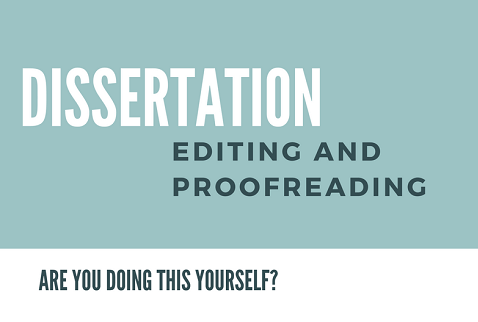Dissertation Editing and Proofreading By Yourself
How to Do Dissertation Editing and Proofreading By Yourself?

There is an old and wise saying – “The lawyer who defends himself has a fool for a client.” Translated to master’s or Ph.D. dissertations, the meaning is the same. The thesis or dissertation writer who chooses him/herself for an editor is equally as foolish.
Emotional Attac hment
The terms “thesis” and “dissertation” vary in meaning, institution to institution. Some define a thesis as the culminating project for a Master’s degree; others define it as the culminating project for a Ph.D. It really doesn’t matter. What does matter is that a student has spent months crafting this thesis or dissertation and now must edit, proofread, and revise before it is submitted in final form to an advisor and/or committee.
The problem is this. Every thesis or dissertation student is emotionally involved and attached to a work on which s/he has been working for months. Every sentence has been laboriously written and a piece of the student’s “soul” is reflected on each page. Because of this “attachment,” the student who engages in Ph.D. thesis editing will not see many obvious errors – errors in structure, flow, grammar, punctuation, etc.
The wise thesis or dissertation writer will find another “expert” to conduct the Ph.D. proofreading and editing. This may be a peer who has expertise in both the research field and scholarly writing; it may be a graduate of the Ph.D. program who can perform this monumental and often tedious task; or it may be the services of a Ph.D. consultant from a professional writing service.
What Quality Editing and Proofreading Entails
Editing and proofreading are two separate tasks. They can be briefly described as this:
Editing entails a general, holistic review of the piece for structure, logical flow, transitions, coherency, and adherence to the guidelines of the academic department. The editor is looking at it objectively to see if everything “makes sense” and is presented with clarity and fluency.

Proofreading entails looking for the more minor, and yet critically important elements. Is the formatting correct? Is the sentence structure sound? Are there errors in such things as subject-verb agreement, pronoun-antecedent agreement, verb tense consistency, and, of course punctuation? Is the bibliography in the correct format? There’s a lot involved in Ph.D. thesis proofreading, and it is tedious work.
You Can’t Really Do This Yourself
You have to have an objective set of eyes on your finished product. Dissertation editing and proofreading is just too important to leave it to chance. So, don’t try to go it alone. Find that right colleague, peer, or writing service that can provide the comprehensive edit and review that you need. Ph.D. proofreading and editing is not a job for amateurs. Nor is it a job for the person who has actually written the piece.
Keep Your Eye on the Goal
Your goal is approval – approval of your advisor or committee, or both. That approval will come when the finished product is perfectly polished. Don’t cut corners with editing and proofreading. If you do, you’ll be re-writing.
Our Advantages
Quality Work
Unlimited Revisions
Affordable Pricing
24/7 Support
Fast Delivery